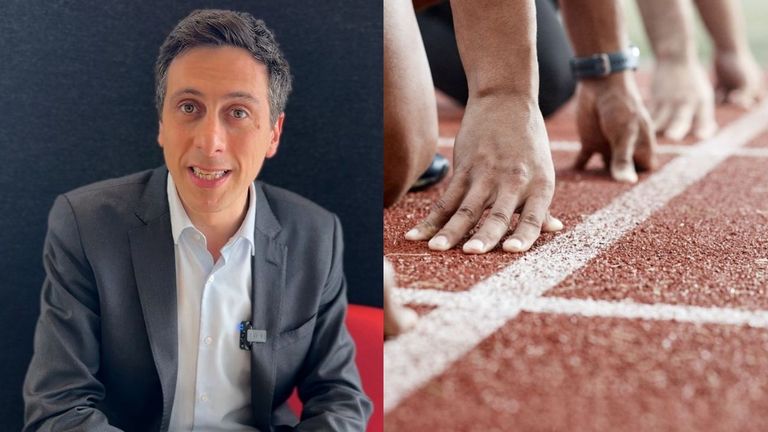
Former British athlete Lynsey Sharp has told Sky News she would have won a bronze medal at the Rio Olympics in 2016 had today’s gender testing rules been in place then.
Sharp came sixth in the women’s 800m final behind three now-barred athletes with differences in sexual development (DSD).
She told sports presenter Jacquie Beltrao the sport has changed considerably from when she was competing.
“Sometimes I look back and think I could have had an Olympic medal, but I gave it my all that day and that was the rules at the time,” she said.
“Obviously, I wish I was competing nowadays, but that was my time in the sport and that’s how it was.”
The Rio women’s 800m final saw South Africa’s Caster Semenya take gold, with Burundi’s Francine Niyonsaba and Margaret Wambui winning silver and bronze respectively. All three would have been unable to compete today.
Semenya won a total of two Olympic gold medals before World Athletics introduced rules limiting her participation in the female class.
In a major policy overhaul introduced this year, World Athletics now requires athletes competing in the female category at the elite level of the sport to take a gene test.
The tests identify the SRY gene, which is on the Y chromosome and triggers the development of male characteristics.
The tests replace previous rules whereby athletes with DSD were able to compete as long as they artificially reduced their testosterone levels.
Sharp says while she was competing, governing bodies “didn’t really deal with the issue head on”, and she was often portrayed as a “sore loser” over the issue.
Despite running a Scottish record in that race, her personal best, she described the experience as a “really difficult time”.
“Sadly, it did kind of taint my experience in the sport and at the Olympics in Rio,” she said.
Sharp added that despite the changes, it remains a “very contentious topic, not just in sport, but in society”.
Read more:
World Athletics to introduce mandatory sex testing
Caster Semenya ruling on sex eligibility case
Olympic gold medallist appeals over genetic sex testing
Boxing has now also adopted a compulsory sex test to establish the presence of a Y chromosome at this month’s world championships.
The controversial Olympic champion Imane Khelif, who won Olympic welterweight gold in Paris 2024 in the female category, did not take it and couldn’t compete.
She has appealed to the Court of Arbitration for Sport against having to take the test.
Sharp’s comments come as British athletics star and Olympic champion Keely Hodgkinson is tipped to win her first world title in Sunday’s women’s 800m final at the World Athletics Championships in Tokyo.
She is returning from a year out after suffering two torn hamstrings.
















